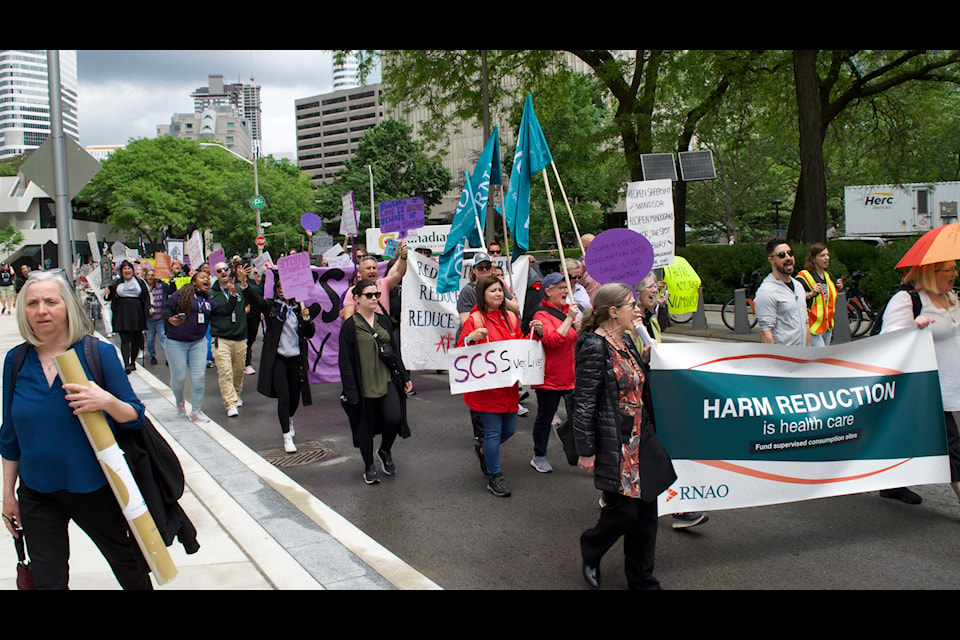On Tuesday, frontline workers, advocates and community members travelled across Ontario, and marched from Trinity Square to Queen’s Park to demand support for supervised consumption services (SCS], more commonly known as safe injection sites.
Cries for harm reduction rang through the streets as the protestors walked towards Queen’s Park on a rainy afternoon.
Dr. Doris Grispun, the CEO of the Registered Nurses Association of Ontario said she wished she didn’t have to march and rally for safe consumption sites for people who use substances.
“It's a health issue and should be treated as a health issue like every other condition,” Grispun said. “The funding has stopped and we are here to urge the premier to get it done. Get it done.”
She said at a safe consumption site, healthcare professionals safely test and administer the substances to those who need them.
“Announce the funding for the sites," Grispun said. "At the very least, [the sites] in Sudbury to continue, in Windsor to continue. In Timmins [it] needs to happen, in Belleville [it] needs to happen. In Peterborough, there was an increase of 28 per cent last year in deaths related to toxic substances.”
Zoë Dodd, a frontline harm reduction and support worker, and an activist was presenting speakers for the rally.
Dodd said she was one of the people who ran the first-ever overdose prevention site in Ontario in 2017.
“We showed the government how you can do it," she said. "And we've never stopped. That was seven years ago.”
Dodd said they were not speaking about the addiction crisis. They were focusing on unregulated, toxic drug supplies.
“What we've seen in Alberta is cuts to harm reduction and a tripling of overdose deaths, and a province that dehumanizes people and does not care or value whether they live or die,” she said. “We're here because this government used an incident outside of a supervised consumption site to not fund supervised consumption sites in this province.”
Iye Sanneh, an SCS site user and satellite harm reduction worker, gave an emotional account of how an SCS site helped her battle her fentanyl addiction.
“Safe consumption sites gave me the resources to connect to other programs and people that help provide support to my recovery from opiates through the use of nurses, doctors, counsellors and peer workers,” Sanneh said. “They saved my life for long enough to get me into a treatment program without which I very well may not still be alive and standing here able to address you about this crucial life or death matter.”
She said the staff present at the SCS sites not only run them and deliver life-saving healthcare but also make the users feel comfortable and offer resources for help.
This past March, 51 community groups wrote an open letter to the provincial government to support and fund supervised consumption sites across Ontario.
Eight urgent, emergency actions were outlined, including emergency funding and the deadline was set for March 29.
According to a press release by the Canadian Drug Policy Coalition, seven to 10 people were killed every day in Ontario due to toxic, unregulated drugs.
In 2023, around 3,644 people had succumbed to toxic consumption.
“The Province of Ontario put all supervised consumption services funding applications on indefinite hold pending a lengthy review period, adding to the already years-long wait for some jurisdictions,” the press release by the CDPC said.
The Open Letter to the Ministry of Health of Ontario emphasized the importance of the Consumption and Treatment Services in the face of increased deaths, hospitalizations and traumatic injuries due to unregulated drugs.
“In 2018, the Ontario government arbitrarily capped funding to only 21 CTS," the letter said. "Six years later, the government has still not delivered on funding 21 sites. Despite [the] overwhelming need and local support, the Ontario government has approved and funded only 17 CTS locations across the entire province.”
After two weeks of silence from the provincial government, the CDPC released another statement on March 18, 2024, urging the officials to eliminate the barriers and provide provincial funding for the supervised consumption sites.
“The dead would fill every seat on at least eleven school buses. This is an emergency. The province needs to start acting like it,” Beeta Senedjani of the CDPC said in the statement.
According to a study released by The Lancet in February 2024, overdose deaths decreased by 67 per cent in neighbourhoods that had implemented SCS as compared to other neighbourhoods.
Grispun said that this treatment is just as crucial as a cancer treatment. It is expensive.
“And when a person that uses substances is ready for the treatment, the treatment needs to be there because that window may close very soon for the person,” she said. “And it needs to be accessible publicly.”



